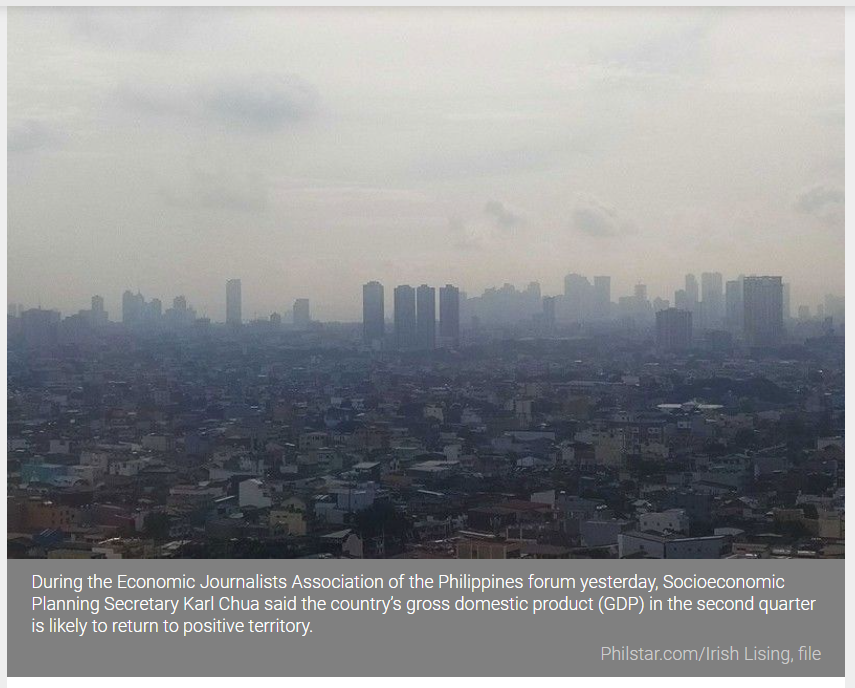Philippines: NEDA sees positive Q2 GDP
MANILA, Philippines — The Philippine economy is expected to turn in a strong second quarter performance, but sustaining such growth hinges on the reopening of economic activities to bring back consumption and boost business confidence, the country’s top economic planner said.
During the Economic Journalists Association of the Philippines forum yesterday, Socioeconomic Planning Secretary Karl Chua said the country’s gross domestic product (GDP) in the second quarter is likely to return to positive territory.
The economy is coming from five consecutive quarters of decline as the pandemic continues to take its toll.
Also, the base effects of the 16.9 percent contraction in the second quarter last year will also push the figures up.
This is also considering that restrictions were reimposed at the beginning of the quarter in efforts to arrest the renewed surge in COVID-19 cases.
While Chua believes that a strong quarterly rebound is on the way, the caveat lies on when the Philippines will fully open the economy.
“We did not close down 75 percent of the economy, we allowed most sectors to operate, transportation to continue and our curfew does not apply to workers. All the latest data suggest a strong positive growth but to sustain it, we have to do more,” Chua said.
“If we don’t manage the risk and gradually open up, then everyone is affected. We can strike a better balance to allow the far majority of people with lower risks to continue their economic activities,” he said.
More than a year into the pandemic, the Philippines still has the strictest quarantine measures in the world. It is the only country with policies of keeping children at home and a 100 percent closure of face-to-face learning.
And with a young population and an economy driven by consumption especially by families, consequences of an economic fallout is expected.
Chua said about 50 percent of non-essential consumption is driven by families and in a demographic profile where the median age is 24, a huge problem lies when these people cannot go out.
“We should learn from other countries so we can get as many families and schooling back to normal. We identify the risk areas and address those and vaccinate as many people as we can,” Chua said.
NEDA has been pushing for the slow reopening of face-to-face classes but the government has yet to decide on this.
The general idea is that in the lowest risk areas we can pilot at least a hybrid form of learning. Most assessments show that face to face learning has very weak outcomes,” Chua said.
Further, Chua said the government continues to provide support in terms of fiscal spending, lower taxes and monetary support through the banking system to address the needs of small businesses who have been affected.
But, he argued that no matter how much money or stimulus the government gives, if the economy is artificially prevented from operating, then there is no way to get out.
“Stimulus works if the economy is allowed to operate so that consumer demand can return. But if you close it and prevent half of the economy and even the children and families from going out, no matter how you pump prime them, they will not be able to fully help,” he said.
This year, the government is targeting to achieve a six to seven percent GDP growth, from a 9.6 percent contraction in 2020.
“The economic performance is due to an artificial policy of restricting economic performance because of excessive risk aversion last year and that’s why we are changing our objective to risk management,” Chua said.
“We are looking at resuming our growth trajectory by the second half of 2022, there will be several changes and we have proposed several reforms to help us transition into a new economy,” he said.
The government has allocated more than 15 percent of GDP in terms of fiscal, monetary and financial resources that are being accelerated for implementation.
These include health and social protection measures such as the first and second package of the Bayanihan, laws that will lower taxes and give more targeted, transparent and performance-based incentives, infrastructure funds, and the 2021 national budget geared toward recovery and protection from the pandemic.
Source: https://www.philstar.com/business/2021/06/16/2105726/neda-sees-positive-q2-gdp


 English
English




